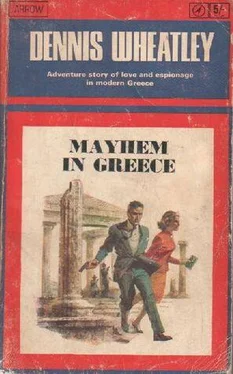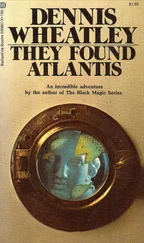Tearing himself away, he crossed the road and entered a big patisserie. The cake and sweet shops of Athens are perhaps rivalled only by those in Paris. Their windows are filled with every form of confection, from elaborate iced creations to an amazing variety of pastries and boxes of chocolates of all shapes and sizes. There are, too, at least six such shops to the square mile for every one in the West End of London. Chocolates made of every kind of nut and toffee, or filled with liqueurs, nougat and sugared almonds are their speciality, but they have much less choice to offer in soft chocolates and sweets made with cream, because of the permanent shortage of butter and fats in Greece.
Robbie was, therefore, surprised to see that a special display had been made of some boxes of large, vari-coloured fondants. He bought half a kilo and remarked on their being a new line, upon which the girl behind the counter told him that they had only just come in and were from Czechoslovakia.
That sent his mind back to his recent interview. With a gullibility that was a natural corollary to his own transparent honesty, he had accepted Mr. Nassopoulos* statement at its face value. By the time he had descended in the lift from the Minister's office, he had been laughing at himself for ever having imagined that there was something sinister behind the tobacco crop deal, j*ud his own absurd idea that he might bring off a great coup if he took on the role of a secret agent. Now, his chance discovery that the Greeks were importing sweets from Czechoslovakia made it look as if the two countries had entered into a much Wider bargain; in fact, it must be so, because Greece was much to.° Poor a country to import anything without a quid pro quo, With the exception of essentials for her industries.
On the face of it, such a pact held no sinister meaning for the Western Powers, which made it seem odd to Robbie that Nassopoulos had not told him frankly about it. Of course, when making their offer for the tobacco crop, the Czechs, knowing there was no oil to be had in Greece, might quite well have insisted on the Greeks agreeing, in addition to that concession, to take some of their exports in part payment for the crop. Yet, if they were getting fair value in this way, why should they also have wanted the concession to prospect for oil?
Nassopoulos had given as their reason a wish to have something to show that would justify their paying a bigger price than was necessary for several million pounds' worth of tobacco. The Greeks had probably thought that strange, but they would have been the last people to raise any question about it, because it cost them nothing to give the concession, and their one anxiety must have been to dispose of their crop on satisfactory terms. Yet it was strange.
The Governments of democracies like Britain had to mind their ps and qs. If they used their people's money to buy in a bad market without some adequate justification, the papers created a stink about it, and several real bungles of that kind might lead to the Party in power being thrown out at the next election. But in the Iron Curtain countries matters were very different. The only thing their Governments had to watch out for was to retain the approval of 'Big Brother' in Moscow. The people had no say-whatever in Communist-run countries. The Party bosses ran the show as they saw fit, and did not have to provide excuses for anything they chose to do with their nation's money.
All the way back, up the broad Vasilissis Sofias to Loukianou Street, on the corner of which stood the British Embassy, Robbie pondered this problem, but could find no answer to it.
At lunch there were half a dozen people, so he had to make polite conversation and postpone further thought about his problem until the guests had gone. Afterwards he went up to his room and tried to work at his book, but the right words would not come. That had happened on previous occasions and he had a sovereign remedy for it—an hour spent up on the Acropolis among the ancient temples never failed to bring him fresh inspiration.
He had no car of his own, neither had he ever attempted to drive one, for he had been told in his late teens that, owing to his slow responses, he would prove a danger to himself and others. Having walked down the broad boulevard, he picked up a taxi opposite the Royal Palace and, within ten minutes, was approaching the scene of Greece's greatest glory.
Like a big, oval island, the Acropolis stood out above the roofs of the city. Except for the steep slope at its south-west point that gave access to the almost level plateau on which stood its temples, its five-hundred-foot-high cliffs rose sheer on all sides. On national holidays and during the tourist season, it was floodlit at night by dozens of batteries, each consisting of a score of searchlights that played not only on its temples but also on its cliffs. Seen like that, the natural grandeur of its site crowned by the highest art of man, made it appear a city of palaces high up in the night sky, and a worthy dwelling for the gods. But even by day, seen from any angle, it was tremendously impressive.
Robbie's taxi took him along below its southern face, into which, daring Greco-Roman times, had been built the Theatre of Dionysus, the long portico of Eumenes and the Odeon of Herodes Atticus. Turning north, it carried him half-way up the slope that had been made into a delightful park. For the remainder of the steep ascent he had to walk, but soon he had reached the Sacred Way and was climbing the broken stones that formed the staircase to the mighty Propylaea.
At the top of the giant staircase he paused to look back. On his left he now had the Temple of Victory, on his right the Column of Agrippa, above which had once towered the hundred-foot-high statue of Pallas Athene. Before him was spread the panorama of what had been the heart of the early city-state— the Areopagus, or Hill of Mars. There the Great Council had sat, to try such famous men as Socrates. Beyond it lay the stony hillside, with its gaping cells, in one of which Socrates had been imprisoned, and the Pnyx, a long slab of rock from which world-renowned orators had declaimed to assemblies of the people before they voted on the laws that were to govern the first democracy.
These nearer objects caught the eye against the backdrop of a splendid panorama. To the north-west the summits of the Aigaleos range were outlined against an azure sky, to the west lay Piraeus and the Isle of Salamis, to the south-west there sparkled the blue waters of the Gulf of Athens, and to the west rose the mountain of Hymettus, famous for its honey.
Turning, Robbie made his way toward the centre of the plateau. To his right front now lay the Parthenon. For over two thousand one hundred years it had retained, except for its looted interior, its pristine glory; but in 1687, when the vandal Turks were besieged on the Acropolis, they had used it as a powder magazine. A shell had blown up the magazine, shattering the greater part of the wonderful reliefs depicting the procession of the Panathenaea festival; but even so defaced, its rows of marble columns and perfect proportions made it a thing to marvel at.
Robbie knew every metope and corner of it, but he was not going there today. Instead, he inclined half left towards the trechtheum, the second largest temple on the Acropolis, that had supporting its west portico the row of tall marble female figures called Caryatides. Instead of advancing so far, he stopped short front of the south face of the temple. Some yards in front of ^ a solitary olive tree, the only tree of any kind on the Acropolis, was growing out of a square, stone trough.
It is related that, on the founding of Athens, Poseidon and Athene both wished to become the patron of the city. A Council of the gods was called, and Zeus decreed that the honour should go to whichever of the rivals produced a gift which would prove the more useful to men. The Sea King struck the earth with his trident and out sprang a horse. Athene produced an olive tree, and this symbol of peace and plenty was adjudged the more valuable gift; so she became the protectress of Athens.
Читать дальше












